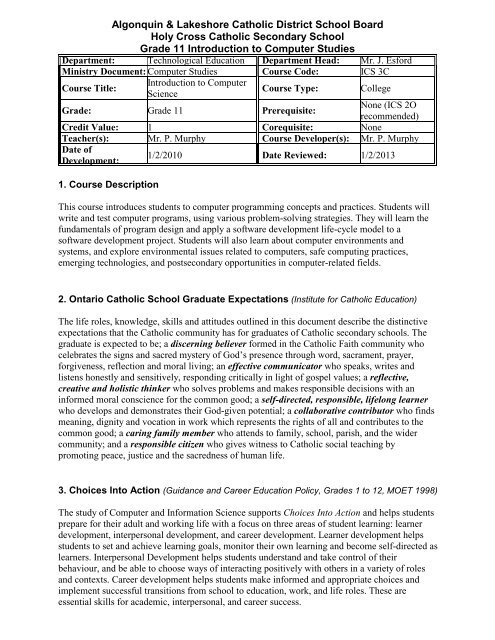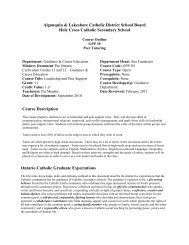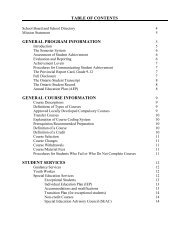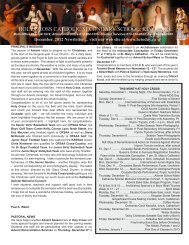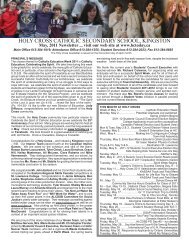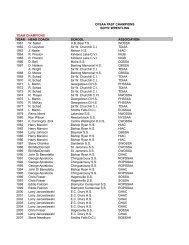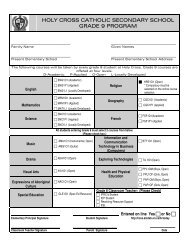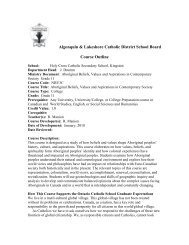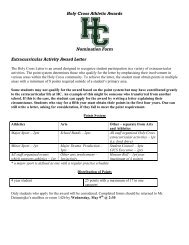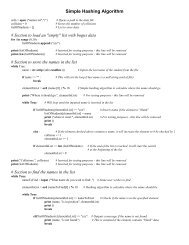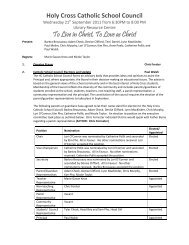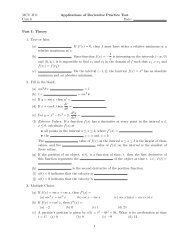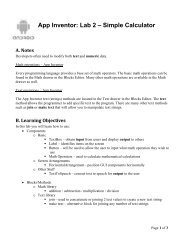ICS 3C Outline - Algonquin and Lakeshore Catholic District School ...
ICS 3C Outline - Algonquin and Lakeshore Catholic District School ...
ICS 3C Outline - Algonquin and Lakeshore Catholic District School ...
You also want an ePaper? Increase the reach of your titles
YUMPU automatically turns print PDFs into web optimized ePapers that Google loves.
<strong>Algonquin</strong> & <strong>Lakeshore</strong> <strong>Catholic</strong> <strong>District</strong> <strong>School</strong> Board<br />
Holy Cross <strong>Catholic</strong> Secondary <strong>School</strong><br />
Grade 11 Introduction to Computer Studies<br />
Department: Technological Education Department Head: Mr. J. Esford<br />
Ministry Document: Computer Studies Course Code: <strong>ICS</strong> <strong>3C</strong><br />
Course Title:<br />
Introduction to Computer<br />
Science<br />
Course Type: College<br />
Grade: Grade 11 Prerequisite:<br />
None (<strong>ICS</strong> 2O<br />
recommended)<br />
Credit Value: 1 Corequisite: None<br />
Teacher(s): Mr. P. Murphy Course Developer(s): Mr. P. Murphy<br />
Date of<br />
Development:<br />
1/2/2010 Date Reviewed: 1/2/2013<br />
1. Course Description<br />
This course introduces students to computer programming concepts <strong>and</strong> practices. Students will<br />
write <strong>and</strong> test computer programs, using various problem-solving strategies. They will learn the<br />
fundamentals of program design <strong>and</strong> apply a software development life-cycle model to a<br />
software development project. Students will also learn about computer environments <strong>and</strong><br />
systems, <strong>and</strong> explore environmental issues related to computers, safe computing practices,<br />
emerging technologies, <strong>and</strong> postsecondary opportunities in computer-related fields.<br />
2. Ontario <strong>Catholic</strong> <strong>School</strong> Graduate Expectations (Institute for <strong>Catholic</strong> Education)<br />
The life roles, knowledge, skills <strong>and</strong> attitudes outlined in this document describe the distinctive<br />
expectations that the <strong>Catholic</strong> community has for graduates of <strong>Catholic</strong> secondary schools. The<br />
graduate is expected to be; a discerning believer formed in the <strong>Catholic</strong> Faith community who<br />
celebrates the signs <strong>and</strong> sacred mystery of God’s presence through word, sacrament, prayer,<br />
forgiveness, reflection <strong>and</strong> moral living; an effective communicator who speaks, writes <strong>and</strong><br />
listens honestly <strong>and</strong> sensitively, responding critically in light of gospel values; a reflective,<br />
creative <strong>and</strong> holistic thinker who solves problems <strong>and</strong> makes responsible decisions with an<br />
informed moral conscience for the common good; a self-directed, responsible, lifelong learner<br />
who develops <strong>and</strong> demonstrates their God-given potential; a collaborative contributor who finds<br />
meaning, dignity <strong>and</strong> vocation in work which represents the rights of all <strong>and</strong> contributes to the<br />
common good; a caring family member who attends to family, school, parish, <strong>and</strong> the wider<br />
community; <strong>and</strong> a responsible citizen who gives witness to <strong>Catholic</strong> social teaching by<br />
promoting peace, justice <strong>and</strong> the sacredness of human life.<br />
3. Choices Into Action (Guidance <strong>and</strong> Career Education Policy, Grades 1 to 12, MOET 1998)<br />
The study of Computer <strong>and</strong> Information Science supports Choices Into Action <strong>and</strong> helps students<br />
prepare for their adult <strong>and</strong> working life with a focus on three areas of student learning: learner<br />
development, interpersonal development, <strong>and</strong> career development. Learner development helps<br />
students to set <strong>and</strong> achieve learning goals, monitor their own learning <strong>and</strong> become self-directed as<br />
learners. Interpersonal Development helps students underst<strong>and</strong> <strong>and</strong> take control of their<br />
behaviour, <strong>and</strong> be able to choose ways of interacting positively with others in a variety of roles<br />
<strong>and</strong> contexts. Career development helps students make informed <strong>and</strong> appropriate choices <strong>and</strong><br />
implement successful transitions from school to education, work, <strong>and</strong> life roles. These are<br />
essential skills for academic, interpersonal, <strong>and</strong> career success.
4. Units & Overall Expectations (The Ontario Curriculum, Grades 10 to 12 Computer<br />
Studies, 2008 (revised)<br />
Note that units may be taught in an independent or an integrated manner <strong>and</strong> they are listed in no<br />
particular order below.<br />
Unit A - Programming Concepts <strong>and</strong> Skills<br />
By the end of this course, students will:<br />
A1. demonstrate the ability to use different data types in expressions in simple computer<br />
programs;<br />
A2. demonstrate the ability to use control structures <strong>and</strong> simple algorithms in computer<br />
programs;<br />
A3. use proper code maintenance techniques <strong>and</strong> conventions when creating computer programs.<br />
Unit B - Software Development<br />
By the end of this course, students will:<br />
B1. use a variety of problem-solving strategies to solve different types of problems;<br />
B2. design software solutions to meet a variety of challenges, using a set of st<strong>and</strong>ards;<br />
B3. design simple algorithms according to specifications;<br />
B4. apply a software development life-cycle model to a software development project.<br />
Unit C - Computer Environments <strong>and</strong> Systems<br />
By the end of this course, students will:<br />
C1. demonstrate an underst<strong>and</strong>ing of the functions of different types of computer components;<br />
C2. use appropriate file maintenance practices to organize <strong>and</strong> safeguard data;<br />
C3. use a software development environment to write <strong>and</strong> run computer programs.<br />
Unit D - Topics in Computer Science<br />
By the end of this course, students will:<br />
D1. describe computer use policies that promote environmental stewardship <strong>and</strong> sustainability;<br />
D2. describe <strong>and</strong> apply procedures for safe computing to safeguard computer users <strong>and</strong> their data;<br />
D3. explain key aspects of the impact that emerging technologies have on society;<br />
D4. describe postsecondary education <strong>and</strong> career prospects related to computer studies.<br />
5. Learning Skills (Growing Success, Assessment, Evaluation, <strong>and</strong> Reporting In Ontario<br />
<strong>School</strong>s, First Edition, Covering Grades 1 to 12, 2010, Ontario Ministry of Education)<br />
Student learning skills will be assessed <strong>and</strong> recorded separately from achievement of curriculum<br />
expectations on their report card (using a four-point scale: E-Excellent, G-Good,<br />
S-Satisfactory,N-Needs Improvement) in the following areas:<br />
* Responsibility(fulfils responsibilities,completes&submits work on time,manage own behaviour)<br />
* Organization(plan,time management,uses technology&resources to complete tasks)<br />
* Independent Work(independently monitors work,uses class time appropriately,min.supervision)<br />
* Collaboration(Shares group work,positive interaction, resolves challenges,shares resources)<br />
* Initiative(Open to new ideas,innovation,interest in learning,positive attitude,protects rights)<br />
* Self-regulation(sets <strong>and</strong> monitors personal goals,seeks assistance,assesses needs,effort))
6. Accommodations<br />
Whenever accommodations are made to address student learning needs, or alternative or modified<br />
expectations are identified for a student, these accommodations, modifications, or alternative<br />
expectations will be outlined in an Individual Education Plan (IEP) <strong>and</strong> will be communicated to<br />
parents. Selections from the following may be considered for use:<br />
* provide photocopies * set up a study plan with the student<br />
* give extra time on a given task * highlight key points on print materials<br />
* provide one-on-one instruction * model a variety of test-taking strategies<br />
* pair the student with a study buddy * use simple language <strong>and</strong> directions<br />
* provide a quiet place to work * provide organizational tools<br />
7. Assessment <strong>and</strong> Evaluation (The Ontario Curriculum, Grades 10 to 12 Computer<br />
Studies, 2008 (revised), Administrative Procedures, Secondary <strong>School</strong> Policy for Assessment,<br />
Evaluation, Grading <strong>and</strong> Reporting, Grades 9-12, ALCDSB September, 2006)<br />
Students will be assessed <strong>and</strong> evaluated based on their achievement of the specific course<br />
learning expectations. Student achievement of the overall expectations will be evaluated in a<br />
balanced manner among the four learning categories. The breakdown for this course is:<br />
Knowledge &<br />
Underst<strong>and</strong>ing<br />
Subject-specific content acquired in each course (knowledge), <strong>and</strong><br />
the comprehension of it’s the meaning <strong>and</strong> significance<br />
(underst<strong>and</strong>ing).<br />
The use of critical <strong>and</strong> creative thinking skills <strong>and</strong>/or processes, as<br />
follows:<br />
• planning skills (e.g., focusing research, gathering information,<br />
selecting strategies, organizing a project)<br />
Thinking & Inquiry • processing skills (e.g., analysing, interpreting, assessing,<br />
reasoning, generating ideas, evaluating, synthesizing, seeking a<br />
variety of perspectives)<br />
• critical/creative thinking processes (e.g., problem solving, decision<br />
making, research)<br />
Communication The conveying of meaning through various forms.<br />
The use of knowledge <strong>and</strong> skills to make connections within <strong>and</strong><br />
Application<br />
between various contexts.<br />
Total Term Work Summative evaluation<br />
Course Work Evaluation<br />
70% of the grade will be based on term work evaluations conducted throughout the course.<br />
Student work is assessed <strong>and</strong>/or evaluated in a balanced manner with respect to the four<br />
categories, <strong>and</strong> that achievement of particular expectations is considered within the appropriate<br />
categories.<br />
Summative Evaluation<br />
30% of the grade will be based on a final evaluation in the form of a culminating project /<br />
activity. This portion will reflect the student’s most recent level of achievement.<br />
70% Course work<br />
30% Culminating projects / exam<br />
100% Total Mark
8. Due Dates - Holy Cross Late Policy<br />
All summative evaluation activities are due on the date specified by the teacher. It is recommended<br />
that teachers set this date in consultation with staff <strong>and</strong> students. At the school's discretion, in cases of<br />
lateness, a teacher may use a mark penalty deduction of up to one level. Once a class set of<br />
assignments has been returned to students, a teacher is under no obligation to accept late assignments.<br />
For missed assignments, the mark deduction can be the full value of the assignment.<br />
9. Assessment & Evaluation Strategies<br />
An appropriate selection of assessment strategies will be used which will allow evaluation of student<br />
achievement of the curriculum expectations. Selections from the following list of assessment <strong>and</strong><br />
evaluation tools may be used:<br />
* tests * checklists<br />
* quizzes * learning skills track sheet<br />
* rubrics / achievement charts * oral questions & review<br />
* peer & self evaluation * oral critique<br />
* drafts/attempts/feedback/benchmarks * formative projects<br />
* summative culminating project / activity<br />
10. Teaching / Learning Strategies<br />
A variety of instructional methods <strong>and</strong> strategies will be used which will facilitate student learning.<br />
Selections from the following list of teaching / learning strategies may be used:<br />
* lectures * teacher <strong>and</strong> student demonstrations<br />
* audio / visual presentations * computer based assignments<br />
* student-centred activities * team projects<br />
* internet based research<br />
11. Key Dates, Special Events, Additional Considerations<br />
The primary programming language the students will be using is Python 3.1 with the Idle Editor.<br />
This software is available for download on the Internet free of charge.<br />
Students will also be using software that they may not have access to outside of the school. The<br />
expectation therefore is that computer based assignments will be completed at school. The computer<br />
labs are often available at lunch <strong>and</strong> after school but students are responsible for ensuring they have<br />
access to the computer outside of class time if required.<br />
Since students are expected to use the Internet on a regular basis, students <strong>and</strong> parents must sign the<br />
ALCDSB Junior/Intermediate Student Acceptable Computer Use Agreement.<br />
12. Learning Resources<br />
Selections from the following learning resources may be used:<br />
* instructional <strong>and</strong> information web sites * books, magazines <strong>and</strong> newspapers<br />
* student exemplars * tutorial software
13. Board, <strong>School</strong>, Department <strong>and</strong> Classroom Policies<br />
The following policies apply to this course:<br />
* Administrative Procedures. October 2005. Secondary <strong>School</strong> Policy for Assessment, Evaluation,<br />
Grading <strong>and</strong> Reporting, Grades 9-12, 2005-2006.<br />
* Holy Cross <strong>Catholic</strong> Secondary <strong>School</strong>. September 2006. Student Code of Conduct <strong>and</strong><br />
Behaviour. Student H<strong>and</strong>book, 2006-2007.<br />
* Rules <strong>and</strong> Regulations Governing Shop Safety. September 2006. Holy Cross <strong>Catholic</strong> Secondary<br />
<strong>School</strong>, Technological Education Department.<br />
* Student Acceptable Computer Use Agreement - Junior/Intermediate, <strong>Algonquin</strong> <strong>and</strong> <strong>Lakeshore</strong><br />
<strong>Catholic</strong> <strong>District</strong> <strong>School</strong> Board.


